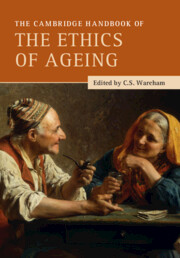Book contents
- The Cambridge Handbook of the Ethics of Ageing
- Cambridge Handbooks in Philosophy
- The Cambridge Handbook of the Ethics of Ageing
- Copyright page
- Contents
- Contributors
- Acknowledgements
- Introduction
- Part I Ageing and the Good Life
- 1 Old Age and the Preference for the Future
- 2 Ageing and the Temporality of the Good Life
- 3 Children’s Prudential Value
- 4 The Ethics of Ageing in Frank Perry’s The Swimmer
- 5 Is Ageing Good?
- 6 Mental Health in Old Age
- 7 In Defense of a Semi-Stoical Attitude about Ageing and Death
- Part II Ageing and Morality
- Part III Ageing and Society
- References
- Index
2 - Ageing and the Temporality of the Good Life
from Part I - Ageing and the Good Life
Published online by Cambridge University Press: 23 August 2022
- The Cambridge Handbook of the Ethics of Ageing
- Cambridge Handbooks in Philosophy
- The Cambridge Handbook of the Ethics of Ageing
- Copyright page
- Contents
- Contributors
- Acknowledgements
- Introduction
- Part I Ageing and the Good Life
- 1 Old Age and the Preference for the Future
- 2 Ageing and the Temporality of the Good Life
- 3 Children’s Prudential Value
- 4 The Ethics of Ageing in Frank Perry’s The Swimmer
- 5 Is Ageing Good?
- 6 Mental Health in Old Age
- 7 In Defense of a Semi-Stoical Attitude about Ageing and Death
- Part II Ageing and Morality
- Part III Ageing and Society
- References
- Index
Summary
An in-depth analysis of ageing can assist us in developing a deeper understanding of human temporality and its relevance for the good life. The experience of growing old makes clear that life is essentially a process in time with a particular temporal extension and structure that has important eudaemonic implications. Taking ageing as the starting point and frame of reference, I distinguish three ethically relevant levels of human temporality that become manifest in the process of ageing: the fundamental co-ordinates and parameters of human existence in time; the culturally variable models of the life course and life stages; and the unique individual trajectory through life and its narrative interpretation. These considerations underline the need for a more appropriate appreciation of the temporal dimension and structure of human existence in ethical discussions about the good life.
- Type
- Chapter
- Information
- The Cambridge Handbook of the Ethics of Ageing , pp. 23 - 37Publisher: Cambridge University PressPrint publication year: 2022
- 1
- Cited by

